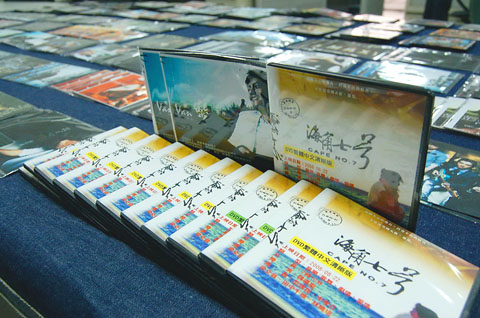The unexpected popularity of the film Cape No. 7 (海角七號) has drawn thousands of tourists to Hengchun (恆春), the town in Pingtung County where the main setting of the film is located.
Directed by Wei Te-sheng (魏德聖), the homegrown comedy has taken in nearly NT$400 million (US$12.3 million) at the box office as of yesterday, potentially making it the highest-grossing Chinese-language film produced in Taiwan.
The house of the film’s main character “Aga” (阿嘉), portrayed by Taiwanese pop singer Van Fan (范逸臣), has also become a must-see tourist attraction for out-of-town visitors.

PHOTO: CHIU SHAO-WEN, TAIPEI TIMES
“In the past, people would skip Hengchun and go straight to Kenting (墾丁),” said Chang Yung-yuan (張永源), the real owner of the house. “Now they make a detour for Hengchun before they head south to Kenting.”
Chang said in an interview with the Taipei Times yesterday that tourists swarmed through the city’s four old gates during the National Day holiday, and most of the hostels in town were full as well. The fact that his old house has been packed with visitors also took Chang by surprise.
Chang said that he was born in the house, which is about 80 years old.
After the Hengchun earthquake two years ago, Chang and his family moved to another house nearby. His wife, however, still uses the kitchen to cook everyday.
“They told my wife they wanted to use the house for a movie and may have to do some renovation,” he said. “I said ‘go ahead’ and let them do whatever they needed to do,” without knowing what the movie was really about.
Chang’s house started getting dozens of visitors a day after the film became a huge success.
“At first, we simply invited them in and let them check out what Aga’s house looks like, but later we just could not take it anymore,” he said.
Chang said the family decided to charge visitors a small fee to help keep the house neat and tidy.
The house is also a hostel now for fans of the movie who want to spend the night in Aga’s bedroom.
The film’s other settings in Pingtung, including the house of the character Kojima Tomoko in Manjhou Township (滿州鄉) and the Chateau Beach Resort in Kenting (墾丁夏都飯店), have become tourist destinations as well.

Taiwanese were praised for their composure after a video filmed by Taiwanese tourists capturing the moment a magnitude 7.5 earthquake struck Japan’s Aomori Prefecture went viral on social media. The video shows a hotel room shaking violently amid Monday’s quake, with objects falling to the ground. Two Taiwanese began filming with their mobile phones, while two others held the sides of a TV to prevent it from falling. When the shaking stopped, the pair calmly took down the TV and laid it flat on a tatami mat, the video shows. The video also captured the group talking about the safety of their companions bathing

US climber Alex Honnold is to attempt to scale Taipei 101 without a rope and harness in a live Netflix special on Jan. 24, the streaming platform announced on Wednesday. Accounting for the time difference, the two-hour broadcast of Honnold’s climb, called Skyscraper Live, is to air on Jan. 23 in the US, Netflix said in a statement. Honnold, 40, was the first person ever to free solo climb the 900m El Capitan rock formation in Yosemite National Park — a feat that was recorded and later made into the 2018 documentary film Free Solo. Netflix previewed Skyscraper Live in October, after videos

Starting on Jan. 1, YouBike riders must have insurance to use the service, and a six-month trial of NT$5 coupons under certain conditions would be implemented to balance bike shortages, a joint statement from transportation departments across Taipei, New Taipei City and Taoyuan announced yesterday. The rental bike system operator said that coupons would be offered to riders to rent bikes from full stations, for riders who take out an electric-assisted bike from a full station, and for riders who return a bike to an empty station. All riders with YouBike accounts are automatically eligible for the program, and each membership account

A classified Pentagon-produced, multiyear assessment — the Overmatch brief — highlighted unreported Chinese capabilities to destroy US military assets and identified US supply chain choke points, painting a disturbing picture of waning US military might, a New York Times editorial published on Monday said. US Secretary of Defense Pete Hegseth’s comments in November last year that “we lose every time” in Pentagon-conducted war games pitting the US against China further highlighted the uncertainty about the US’ capability to intervene in the event of a Chinese invasion of Taiwan. “It shows the Pentagon’s overreliance on expensive, vulnerable weapons as adversaries field cheap, technologically